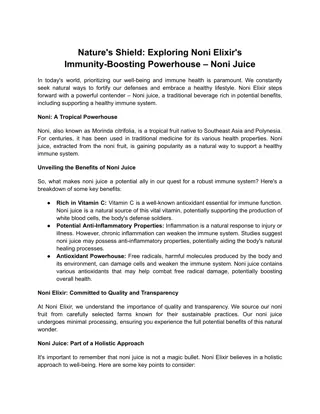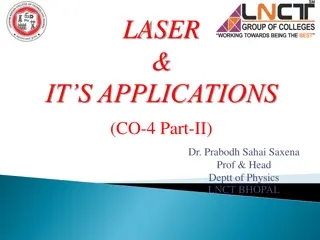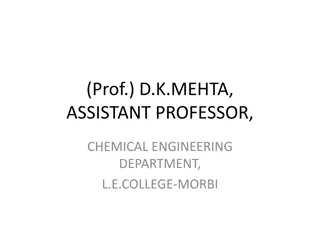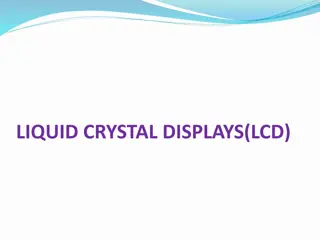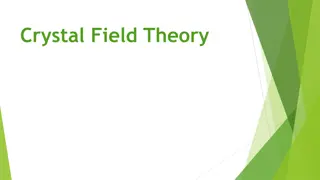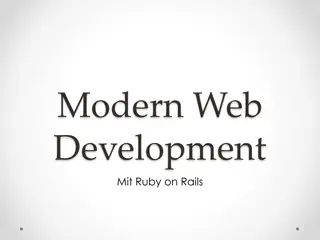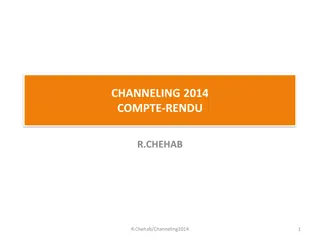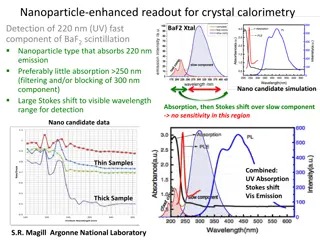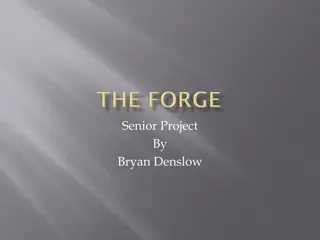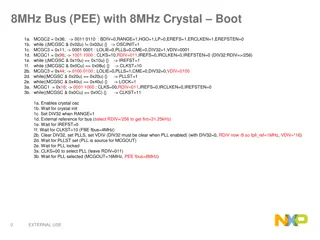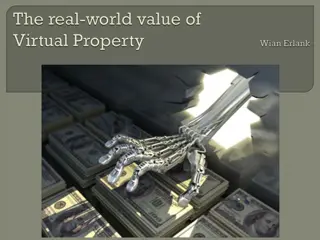Exploring the Diverse Worlds of Ruby, Elixir, and Crystal
In a captivating journey through the realms of Ruby, Elixir, and Crystal, the author unfolds the unique features of each programming language. From the origins in different cultures to the philosophies driving their development, this narrative offers a deep dive into the coding landscape. Through personal reflections and insights, the evolution of Ruby and its impact on developers come to life. Discover the stories, motivations, and ethos behind these powerful languages.
Download Presentation

Please find below an Image/Link to download the presentation.
The content on the website is provided AS IS for your information and personal use only. It may not be sold, licensed, or shared on other websites without obtaining consent from the author. Download presentation by click this link. If you encounter any issues during the download, it is possible that the publisher has removed the file from their server.
E N D
Presentation Transcript
Children of Ruby The different worlds of Elixir and Crystal Simon St.Laurent @simonstl Content Manager, LinkedIn Learning
Where we are Portland is in the land of Chinook peoples, including the Multnomah. I wrote most of this along a former trail between the Cayuga and Onondaga territories of the Haudenosaunee.
Me: a meta-person I only write real code occasionally, with my last big project in 2012. I have spent lots of time in too many languages: SQL Java Ruby Erlang Elixir Crystal HTML Asymetrix Toolbook JavaScript CSS VBScript, VBA XML, XSLT, X* ZX81 BASIC Applesoft BASIC Assembler Spreadsheets HyperCard C Usually this is confusing, but sometimes like today! it s helpful.
Rubys priorities I want to make Ruby users free. I want to give them the freedom to choose. Matz, at https://www.artima.com/intv/ruby3.html Ruby is designed to make programmers happy. Matz, in The Ruby Programming Language.
Ruby achieved its mission I initially fell in love with Ruby because other people s code was just easier to read than anything else I d previously encountered. You needed to learn what how blocks work and what |foo| means, then it all just fell into place. Then when, based on that, you figured out Enumerable, you might have had heart palpitations. - Tim Bray (https://www.tbray.org/ongoing/When/201x/2019/06/12/Go-Creeping-In) But note the title of that piece GoCreeping In.
The Quiet Forks of 2011-2 No one noticed at the time. Rails applications had pushed performance and reliability. Idiomatic Ruby had mostly stabilized. Ruby had avoided the Python 2.x to 3.x drama.
Why Elixir? I was doing a lot of work with Ruby, and making Rails thread-safe. That was my personal pain point, my personal war. I knew the shift was coming along, we wanted to use all the cores on my machine... it took us too long to make it thread-safe, literally years... My original reaction was "there must be a solution to this problem." Once you go, it's hard to come back. The things that those languages, Clojure and Erlang, give you... - Jos Valim, May 2016. https://soundcloud.com/oreilly-radar/jose-valim-interviewed-by-simon-st-laurent
Why Crystal? Fast as C, slick as Ruby. Crystal doesn t allow you to have null pointer exceptions. Compilation (with LLVM) yields safety and performance. Developer happiness and productivity as primary goals.
Two newcomers Jos Valim started Elixir in 2012. Project supported by Platformatec and a growing community. Ary Borenszweig, Juan Wajnerman, and Brian Cardiff started Crystal in 2011. Project supported by Manas Technology Solutions and a growing community. https://elixir-lang.org/ https://crystal-lang.org/
Current status 1.0 released in 2014 1.9 released this month Self-hosting in 2013, first official release in 2014. 0.29.0 released in June.
Whats next As mentioned earlier, releases was the last planned feature for Elixir. We don t have any major user-facing feature in the works nor planned. Major projects yet to come: Complete concurrency Windows support.
Elixir tries to be friendlier Erlang Erlang Elixir -module(count). defmodule Count do -export([countdown/1]). def countdown(from) when from > 0 do IO.inspect(from) countdown(from-1) countdown(From) when From > 0 -> io:format("~w!~n", [From]), countdown(From-1); end countdown(From) -> def countdown(from) do io:format("blastoff!~n"). IO.puts("blastoff!") end end
Crystal tries to be friendlier C C (header file elsewhere!) Crystal #include <stdio.h> void countdown(int count) { for (int i = count; i > 0; i--) { printf("%d\n",i); } printf("Blastoff! \n"); } def countdown (count) while (count) > 0 puts count count -= 1 end puts("Blastoff!") end void main() { countdown(5); } puts countdown(5)
Sometimes all three can (almost) line up Ruby Crystal Elixir def fall_velocity(planemo, distance) gravity = case planemo when :earth then 9.8 when :moon then 1.6 when :mars 3.71 end def fall_velocity(planemo : Symbol, distance : Int32) gravity = case planemo when :earth then 9.8 when :moon then 1.6 when :mars then 3.71 else 0 end def fall_velocity(planemo, distance) when distance >= 0 do gravity = case planemo do :earth -> 9.8 :moon -> 1.6 :mars -> 3.71 end velocity = Math.sqrt(2 * gravity * distance) if velocity == 0 then"stable elsif velocity < 5 then "slow elsif velocity >= 5 and velocity < 10 "moving elsif velocity >= 10 and velocity < 20 "fast elsif velocity >= 20 "speedy end end velocity = Math.sqrt(2 * gravity * distance) if velocity == 0 "stable" elsif velocity < 5 "slow" elsif velocity >= 5 && velocity < 10 "moving" elsif velocity >= 10 && velocity < 20 "fast" elsif velocity >= 20 "speedy" end end velocity = :math.sqrt(2 * gravity * distance) cond do velocity == 0 -> "stable" velocity < 5 -> "slow" velocity >= 5 and velocity < 10 - > "moving" velocity >= 10 and velocity < 20 -> "fast" velocity >= 20 -> "speedy" end end
Both of these children Add an explicit compilation step. BEAM for Elixir LLVM for Crystal. Trim Ruby syntax to a smaller set, with fewer choices. Have Ruby-like ecosystems, with parallel tools for Rails, Sinatra, testing frameworks, and more. Retain Ruby s emphasis on programmer fun and productivity.
Types are the same but different Ruby Crystal Integers (8-64, signed & unsigned) Floats (32 or 64) Bool String Char Hash Array Tuple NamedTuple Symbol Proc Range Object Regex Command (runs in a subshell) Nil Elixir Numbers integer floats booleans strings Boolean Strings Hashes Arrays maps lists tuples Symbols Closures Ranges Objects atoms anonymous functions port Reference PID
Ruby and Crystal and OOP Classical inheritance-based object approaches. A megadose of additional flexibility. Everything is an object. (Almost.) Everything has methods and properties directly available.
Ruby and Crystal support functional Ruby: my_fn = ->(n, m) { n + m } my_fn.call(4, 3) # => 7 Crystal: my_fn = -> (n : Int32, m : Int32) { n + m } my_fn.call(43, 108) # => 151
Elixir is a more drastic shift Yes: my_fn = fn (n, m) -> n + m end my_fn.(44, 108) # => 152 But: no objects, no methods, no properties. (Yes, modules.) Everything that does something is a function.
Elixirs pipe operator Drop.fall_velocity(meters) |> Convert.mps_to_mph Elixir added this syntax sugar early. Ruby 2.7 added something like it, but tricky Crystal: Adding Elixir's pipe operator (|>): in OOP languages we have methods and self. See #1388 . Please don't insist on these things because they will never, ever happen.
Messaging models Sending messages is more flexible than calling functions. Elixir processes communicate by sending messages to each other at named endpoints. OTP cranks up that model. Crystal uses (green) fibers with channels for communications between them, in a Communicating Sequential Processes model. Difficult to compare, because Crystal isn t done.
Macros and metaprogramming Metaprogramming is a huge part of Ruby s appeal. Both Crystal and Elixir step away from method_missing. Crystal still supports monkeypatching, adding new methods to classes and modules. Both Crystal and Elixir offer macros, with warning labels.
Elixirs large promises Dave Thomas: Programming should be about transforming data. Processes (functions) grow and die lightly. OTP supervisors, workers, and a distributed node model. Phoenix layers on top of OTP, but feels like Rails.
Crystals large promises Errors at compile time, not at runtime. Compiler disciplines code while keeping it familiar. Type inference protects you without cluttering code. Compilation gives you the performance you always wanted.
Resilience Crystal Elixir Nil won t break things Let it crash Types ensure reliability OTP supervisors and workers Update code on the fly
Performance Crystal Elixir Tight compilation Parallel processing as normal Running close to the metal Lightweight functions Riding on LLVM Riding on BEAM
Why choose Ruby? Mega-metaprogramming Vast libraries Broad talent pool
Why choose Elixir? Parallelism Distributed applications Uptime
Why choose Crystal? Performance on complex tasks Runtime reliability Application packaging
Please Use It For Good I ll let you determine what good means, but think about it. Please try to use Elixir and Crystal s powers for projects that make the world a better place, or at least not a worse place.
Childrenof Ruby The different worlds of Elixir and Crystal Simon St.Laurent @simonstl Content Manager, LinkedIn Learning
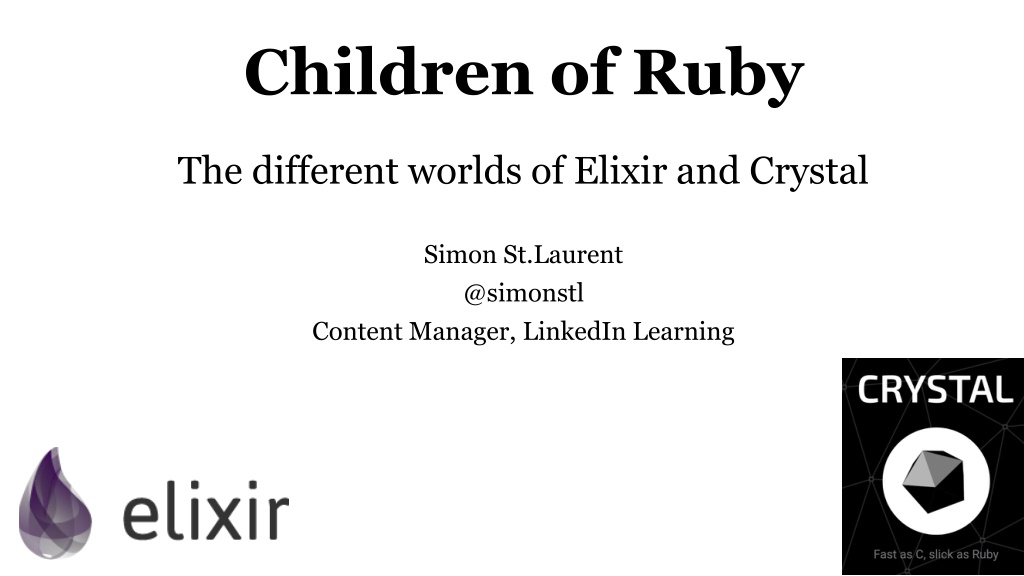

![❤[READ]❤ Cosmic Biology: How Life Could Evolve on Other Worlds (Springer Praxis](/thumb/21556/read-cosmic-biology-how-life-could-evolve-on-other-worlds-springer-praxis.jpg)



